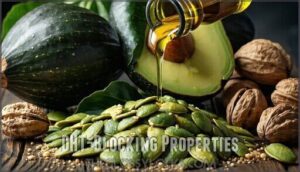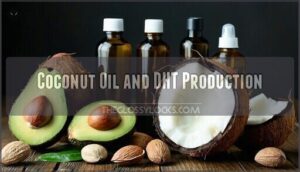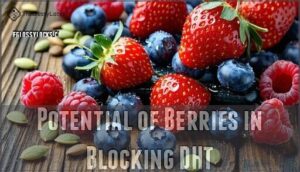This site is supported by our readers. We may earn a commission, at no cost to you, if you purchase through links.
 You can naturally reduce DHT levels through specific DHT blocking natural remedies for hair loss that target this hormone at its source.
You can naturally reduce DHT levels through specific DHT blocking natural remedies for hair loss that target this hormone at its source.
Foods like green tea, pumpkin seeds, onions, and berries contain compounds that inhibit 5-alpha reductase, the enzyme that converts testosterone to DHT.
Topical treatments such as rosemary oil, saw palmetto extract, and pumpkin seed oil can also block DHT production when applied directly to your scalp.
These natural alternatives work by interfering with the hormonal pathway that shrinks hair follicles, giving your hair a fighting chance to regrow. The secret lies in understanding which specific compounds make these remedies so effective, and how they can help with hair loss, by using natural remedies and targeting the hormonal pathway.
Table Of Contents
- Key Takeaways
- Understanding DHT and Hair Loss
- Natural DHT Blockers in Foods
- Effectiveness of Green Tea on DHT
- Benefits of Pumpkin Seed Oil
- Rosemary Oil as a Hair Loss Remedy
- Saw Palmetto for DHT Blocking
- Coconut Oil and DHT Production
- Role of Turmeric in Lowering DHT Levels
- Quercetin in Onions and Asparagus
- Potential of Berries in Blocking DHT
- Frequently Asked Questions (FAQs)
- How can I block DHT and regrow hair naturally?
- What is the best natural DHT blocker for hair?
- Can blocking DHT reverse hair loss?
- What can I put on my scalp to block DHT?
- How to block DHT and regrow hair naturally?
- What is the strongest natural DHT blocker?
- What blocks DHT for hair loss?
- Do natural DHT blockers work for hair loss?
- Are there any potential side effects of natural DHT blockers?
- How long does it take to see results from natural remedies?
- Conclusion
Key Takeaways
- You’ll find the most effective natural DHT blockers in common foods – green tea’s EGCG, pumpkin seeds’ cucurbitin, and turmeric’s curcumin directly inhibit the 5-alpha reductase enzyme that creates hair-damaging DHT.
- Topical applications work faster than dietary changes – applying rosemary oil, saw palmetto extract, or pumpkin seed oil directly to your scalp delivers DHT-blocking compounds where you need them most.
- You’ll need patience for natural remedies to work – expect 3-6 months of consistent use before seeing improvements in hair thickness, with full results taking up to a year.
- Natural DHT blockers are safer but less potent than prescription drugs – while they won’t cause harsh side effects like finasteride, don’t expect dramatic results comparable to pharmaceutical treatments.
Understanding DHT and Hair Loss
Every person battling hair loss needs to understand their enemy: DHT. This potent hormone forms when testosterone meets the 5-alpha reductase enzyme, creating a compound that’s roughly ten times stronger than regular testosterone.
Here’s where things get troublesome—DHT binds to scalp receptors around your hair follicles, triggering follicle miniaturization. This DHT mechanism shrinks healthy follicles into weak, barely-functional versions of themselves.
DHT shrinks your hair follicles like a slow-closing fist, choking off healthy growth.
Think of it like a garden hose slowly getting pinched—less water flows through, and eventually, nothing grows. The androgen impact disrupts your natural hair growth cycle, shortening the anagen phase where hair actually grows.
Your genetics determine how sensitive these scalp receptors are to DHT’s effects. Some folks can have high DHT levels without losing hair, while others experience significant hair loss with moderate levels.
Understanding this process helps you choose effective natural remedies and DHT blocking foods that target the root cause rather than just treating symptoms. While genetics play a role, age also influences hair thinning and balding.
Natural DHT Blockers in Foods
Who knew your grocery list could double as a hair-saving toolkit? Dietary DHT blockers offer a natural approach to combat hair loss by targeting the root hormone behind follicle damage.
DHT blocking foods pack powerful compounds that inhibit 5-alpha reductase, the enzyme converting testosterone to DHT. Pumpkin seeds contain cucurbitin, while soy products like edamame deliver isoflavones that naturally suppress this conversion.
Food preparation methods matter too—lightly cooking eggs enhances biotin absorption, boosting keratin production. Optimal food combinations maximize nutrient bioavailability. Pair vitamin C-rich berries with iron-packed spinach to enhance absorption, or combine turmeric’s curcumin with black pepper for better uptake.
Onions and asparagus provide quercetin, a potent antioxidant blocking DHT formation. Natural hair loss remedies work best with long-term consumption. These foods won’t transform your hairline overnight, but consistent intake supports your body’s natural defense against DHT damage while nourishing follicles from within.
Effectiveness of Green Tea on DHT
Green tea’s DHT-blocking potential lies in its EGCG content, which inhibits 5alpha reductase enzyme activity.
While human clinical trials remain limited, cell studies show EGCG can reduce DHT-induced follicle damage by up to 40%. However, topical green tea applications show more promise than oral consumption for targeted DHT blocking.
According to the linked study, website cookie preferences can impact user experience.
Here’s what research reveals about green tea DHT effectiveness:
- EGCG absorption varies substantially between individuals, affecting DHT-blocking results
- Green tea dosage studies suggest 3-4 cups daily may provide modest follicle protection
- Green tea side effects include potential liver toxicity with excessive supplement use
- Topical green tea applications may deliver EGCG directly to follicles more effectively
Human clinical trials haven’t confirmed substantial DHT reduction from drinking green tea alone, though its antioxidant properties support overall scalp health.
Benefits of Pumpkin Seed Oil
You’ll find pumpkin seed oil contains cucurbitin, a compound that specifically inhibits DHT production by blocking the 5-alpha reductase enzyme.
Studies show this oil can promote hair growth, making it a promising natural remedy for pattern hair loss.
DHT-Blocking Properties
Pumpkin seed oil works by inhibiting 5-alpha reductase, the enzyme that converts testosterone into DHT.
This dietary DHT blocker contains cucurbitin and zinc, creating powerful DHT inhibition mechanisms that protect your hair follicles from shrinking.
Unlike synthetic options, this topical DHT blocker offers supplement effectiveness through natural compounds that directly target DHT production pathways.
Blocking DHT can help manage androgenetic alopecia, a common cause of hair loss.
Hair Growth Promotion
Beyond its impressive DHT-blocking properties, pumpkin seed oil actively promotes robust hair growth through multiple mechanisms.
You’ll notice improved scalp bloodflow and enhanced follicle stimulation, which boost nutrient delivery to weakened roots. This natural treatment helps reduce inflammation while strengthening existing strands.
Research shows significant improvements in hair strength within months of consistent use. Discover pumpkin seed oil products online.
- Enhanced circulation delivers essential nutrients directly to follicles
- Anti-inflammatory compounds create ideal growing conditions
- Strengthened hair shaft structure prevents breakage and thinning
- Improved follicle health supports longer, thicker hair production
Potential Side Effects
Caution guides smart supplementation when using pumpkin seed oil for hair loss. You’ll face Dosage Concerns since excessive amounts trigger stomach upset, while Allergic Reactions affect those sensitive to pumpkins.
Treatment Interactions with medications require medical oversight. DHT blockers can disrupt your Gut Microbiome, potentially causing Hormonal Imbalance.
Some users also report experiencing mild reactions. Monitor these side effects carefully when exploring natural treatments for DHT-related hair concerns.
Rosemary Oil as a Hair Loss Remedy
While pumpkin seed oil shows promise, rosemary oil emerges as another compelling natural hair growth solution.
Clinical studies reveal rosemary oil’s efficacy matches minoxidil 2% after six months of consistent use, with participants experiencing similar hair count improvements. This aromatic DHT blocker works by inhibiting dihydrotestosterone production while enhancing scalp stimulation through improved blood circulation.
For proper oil application, dilute rosemary oil to 2-10% concentration using carrier oils like jojoba or coconut. Apply 3-5 drops daily via gentle scalp massage, leaving the treatment on for 30 minutes to overnight before rinsing.
This protocol promotes nutrient delivery to hair follicles while countering DHT’s growth-suppressing effects.
Rosemary oil hair treatments demonstrate excellent tolerability, with fewer side effects compared to conventional treatments—particularly reduced scalp itching. You can find various rosemary oil products online.
However, research needed includes larger human trials and long-term efficacy data. While promising results suggest rosemary oil belongs among effective natural treatments for hair loss, consistent use over 2-6 months is essential for visible hair growth improvements.
Saw Palmetto for DHT Blocking
Saw palmetto’s reputation as a natural DHT blocker stems from its ability to inhibit 5α-reductase, the enzyme converting testosterone to DHT.
Clinical studies show mixed Saw Palmetto efficacy results, with some participants experiencing hair growth improvements while others see limited benefits compared to pharmaceutical DHT blockers.
Here’s what you should know about saw palmetto hair treatments:
- Saw Palmetto dosage typically ranges from 160-320mg daily, though ideal amounts remain unclear
- Saw Palmetto side-effects are generally mild, including digestive upset and occasional headaches
- Saw Palmetto interactions may occur with blood thinners and hormone medications
Consider Saw Palmetto alternatives like DHT blocking foods if you’re seeking natural hair loss solutions.
Coconut Oil and DHT Production
Coconut oil contains lauric acid, which may help block DHT production by inhibiting 5-alpha reductase.
In vitro studies show promise, but human trials remain limited for confirming DHT blocking effects.
While coconut oil can’t replace proven DHT blockers, it offers scalp health benefits that complement hair loss prevention strategies.
Key coconut oil benefits for hair:
- Moisturizes scalp – Reduces dryness and irritation that can worsen hair loss
- Strengthens hair shafts – Penetrates deeply to reduce protein loss and breakage
- Easy application methods – Use as overnight treatment or pre-shampoo mask
Role of Turmeric in Lowering DHT Levels
While coconut oil works on the surface, turmeric tackles DHT from within.
This golden spice contains curcumin, which blocks the 5-alpha reductase enzyme that converts testosterone into DHT.
Clinical trials show curcumin can substantially reduce both testosterone and DHT levels, making it one of nature’s most effective DHT blockers.
Curcumin’s antiinflammatory properties also combat scalp inflammation that worsens hair loss.
The compound activates vitamin D receptors in hair follicles, encouraging growth while protecting existing strands.
However, curcumin bioavailability remains low when consumed alone, so pair turmeric with black pepper or fat for better absorption.
Most studies suggest a turmeric dosage of 500-1000mg daily for DHT reduction benefits.
Side effects are minimal but can include stomach upset in sensitive individuals.
Add turmeric to smoothies, eggs, or warm milk for a hair-healthy boost that works from the inside out.
Quercetin in Onions and Asparagus
Both onions and asparagus pack quercetin, a natural DHT blocker that targets the enzyme converting testosterone to hair-damaging DHT.
You’ll maximize quercetin absorption by eating these DHT blocking foods raw or lightly cooked, as excessive heat reduces bioavailability.
Regular consumption supports hair loss prevention through reduced oxidative stress and improved scalp circulation.
Potential of Berries in Blocking DHT
If you’re searching for natural DHT blockers, berries might be your secret weapon.
Blueberries, strawberries, and raspberries are loaded with vitamin C and proanthocyanidins, which help improve scalp circulation and reduce oxidative stress—key factors in hair loss treatment.
Thanks to their high Berry Bioavailability, these fruits support collagen production, keeping hair follicles strong.
Research suggests berry combinations can even block 5-alpha reductase, the enzyme that turns testosterone into DHT.
While their effects are milder than pharmaceuticals, eating berries alongside other DHT blocking foods—like pumpkin seeds—can give your hair a fighting chance.
Just don’t expect miracles overnight; think of berries as a steady, reliable friend in your hair health journey.
Frequently Asked Questions (FAQs)
How can I block DHT and regrow hair naturally?
You can naturally block DHT by consuming green tea, pumpkin seeds, turmeric, and onions, which contain compounds that inhibit 5-alpha reductase enzyme production.
What is the best natural DHT blocker for hair?
Green tea’s EGCG stands out as the top natural DHT blocker, protecting follicles while stimulating growth. You’ll also benefit from pumpkin seed oil and turmeric’s curcumin for effective results.
Can blocking DHT reverse hair loss?
Blocking DHT can slow or stop hair loss, but it won’t fully reverse existing damage. You’ll preserve what you have and may see some regrowth, though results vary individually.
What can I put on my scalp to block DHT?
You can apply green tea rinses, coconut oil treatments, or pumpkin seed oil directly to your scalp to naturally inhibit DHT production and protect hair follicles from shrinking.
How to block DHT and regrow hair naturally?
Picture your scalp as parched earth desperately needing nourishment to bloom again.
You’ll want to massage green tea into your scalp, consume pumpkin seeds, and eat turmeric-rich foods daily to naturally block DHT and encourage regrowth.
What is the strongest natural DHT blocker?
Based on scientific research, saw palmetto extract appears to be the strongest natural DHT blocker, demonstrating significant 5-alpha reductase inhibition in clinical studies compared to other botanical options.
What blocks DHT for hair loss?
Research shows 95% of hair loss stems from DHT sensitivity. You can block DHT naturally through green tea’s EGCG, pumpkin seed oil, turmeric’s curcumin, and zinc-rich foods like spinach and mushrooms.
Do natural DHT blockers work for hair loss?
Natural DHT blockers like green tea, pumpkin seed oil, and turmeric show promise in studies, but they’re less potent than prescription medications. You’ll likely see modest results compared to finasteride.
Are there any potential side effects of natural DHT blockers?
Most natural DHT blockers are generally safe when consumed as foods, but you might experience mild digestive upset from supplements like saw palmetto or turmeric extracts.
How long does it take to see results from natural remedies?
Patient persistence pays off when you’re pursuing natural DHT-blocking remedies.
You’ll typically notice initial improvements in hair thickness and reduced shedding within 3-6 months of consistent use, though full results may take up to a year to achieve complete improvements.
Conclusion
While traditional hair loss treatments often come with harsh side effects, DHT blocking natural remedies for hair loss offer a gentler approach that works with your body’s chemistry.
These natural solutions – from green tea’s polyphenols to pumpkin seed oil’s zinc content – target the root cause by inhibiting 5-alpha reductase enzyme activity.
You can safely incorporate these proven remedies into your daily routine, whether through dietary changes or topical applications, giving your hair follicles the support they need to thrive naturally.
- https://akclinics.com/blog/12-most-powerful-natural-dht-blockers-that-stop-hair-loss
- https://www.hairdoctors.com.au/blog/how-to-remove-dht-from-scalp
- https://www.birminghamdermatologyclinic.co.uk/blog/can-you-reduce-levels-of-dht
- https://mydiagnostics.in/blogs/hair-skin/heres-how-to-reduce-dht-levels-in-the-body
- https://www.kaya.in/blog/dht-blocker-foods-for-hair-loss













